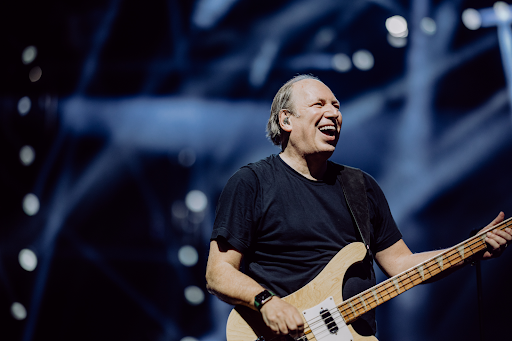Media and Music: The Brilliance of Hans Zimmer
Hans Zimmer has crafted well-composed soundtracks for many films over the years, and your favorite film might be among his work.
In Media and Music, our writers take a deep dive into how movies use scores and songs to engage viewers, give new meaning and tone to some of our favorite scenes, and establish themes. It almost goes without saying, but there are spoilers abound.
Written by Jencie Tomasek
Photo courtesy of Frank Embacher
Behind many successful blockbusters stands Academy Award, Golden Globe, and Grammy award-winning composer Hans Zimmer. He has made a name for himself as one of the greatest movie composers. Here are some Zimmer originals that prove how sound speaks volumes in telling a story.
THE LION KING
Listen to: “Mufasa Dies”
The 1994 classic Disney film The Lion Kingencompasses love, bravery, growing up and family. In a 2018 interview, Zimmer spoke about relating to the main character, Simba, in that he also lost his father as a young boy. In the infamous scene where Simba’s brother pushes their father off of a cliff, intensity and suspense build as the volume of music gets louder until it reaches the climax. Zimmer’s score is in line with the mismatched thumping of your heart as you witness the act, reflecting Simba’s fear and horror as he watches his father die. Yelling blends in with the swelling of the drums to highlight Simba’s screams. Overall, Zimmer’s ability to relate the complex emotions of grief and loss cohesively through sound brings the film to a higher caliber.
GLADIATOR
Listen to: “Now We Are Free”
The storyline of “Gladiator” features a strong character who fights for his family, which calls for a cinematic music experience that transports the viewer and listener to the times of Ancient Rome. This creates an atmosphere of intensity and glory, such as the gladiators felt fighting to the death in the forum. In the ending scene where a dying Maximus sees glimpses of his life, a gentle, decadent female voice sings a song that almost calls for him to stop fighting and come home. The combination of these vocals and the orchestra rising as Maximus becomes closer to death produces chills. Zimmer and vocalist Lisa Gerrard collaborate using idioglossia, an idiosyncratic language invented and spoken by one person. Much as Gerrard is the only one who knows the true meaning of the song, Maximus is the only one who knows what is waiting for him after death. With quavering notes and brief moments of using percussion, Zimmer creates a simple yet moving composition.
“PIRATES OF THE CARIBBEAN” FRANCHISE
Listen to: “He’s a Pirate”
A popular and beloved franchise would be incomplete without its evocative soundtrack. The intro to the main theme of the Pirates of the Caribbean films opens with frantic strings and clashing cymbals. These musical elements mirror the fast pace of the movie and the unpredictable nature of protagonist Jack Sparrow. With the help of aggressive brass and an epic crescendo, Zimmer creates a very intense score. The music falls in a wave-like motion as the pitch rises and falls, which is fitting as most of the action takes place in the water. Its compound time has a certain lilt and dancelike quality, most commonly used in folk or Baroque dancing which is also fitting for the time period of the movie. The percussion is messy and random at times, taking you by surprise. Overall, Zimmer’s theme encapsulates the franchise’s essence.
THE DARK KNIGHT TRILOGY
Listen to: “Time”
Batman is a household name, and Zimmer’s score emphasizes how music defines the iconic character throughout director Christopher Nolan’s “Dark Knight” superhero trilogy. . It’s suspenseful, eerie, and heart-racing. There’s big swelling to a buildup, specifically in “The Dark Knight Theme.” It’s not a happy-go-lucky cartoon-esque Superman theme. It’s dark, frightening, and larger than life, perfectly encapsulating Nolan and Zimmer’s version of Batman. With pulsing drums, the hum of various string instruments, and even natural sounds of bat wings flapping, Zimmer’s theme is foreboding and powerful.
INCEPTION
Listen to: “Time”
Known for being mind-bending and confusing, Zimmer’s score perfectly encapsulates what the inside of someone’s dreams sounds like. “Inception” includes multiple musical gems, spanning large horns to holding out piano notes that elongate the draw the inner escape. The song “Time” employs many instruments, from the beginning and ending piano notes to the building cello and fellow strings. It’s almost five minutes long, and each instrument gets a chance to be featured solely. “Time” gets louder as it goes on before it quiets with a single piano note around the 3:35 mark. Zimmer’s song embodies the way time passes, from the quietness of beginning life all the way to the stillness of death. It’s full circle and dreamlike, as Zimmer intended.
INTERSTELLAR
Listen to: “Cornfield Chase”
Featuring UT’s own Matthew McConaughey, the 2014 film “Interstellar” has an ethereal, otherworldly soundtrack in addition to its stacked cast. The music throughout has an uplifting and wishful tone. Even on the brink of catastrophe, hope lingers in the background. Zimmer takes classic Gothic church horns and uses them to create a wildly complex score. Unlike his typical heavy or bass-driven scores, his work on “Interstellar” is light and almost flightless. With lots of repetition yet very few notes, he turns the monotonous and mundane into something elevated and poignant. It’s a gentle and almost fragile score driven by the love between a father and daughter. Additionally, actor Michael Caine’s reading of “Do Not Go Gentle Into That Good Night” pushes the film’s messages of the resilience of the human spirit and hope for the future forward.

